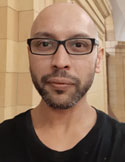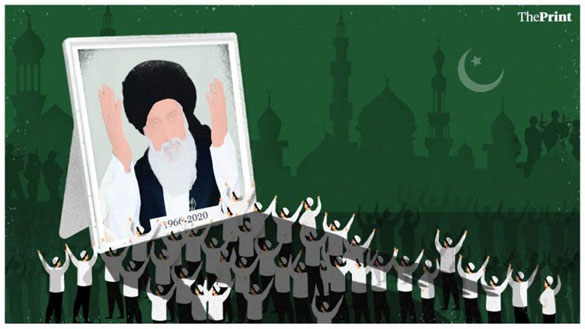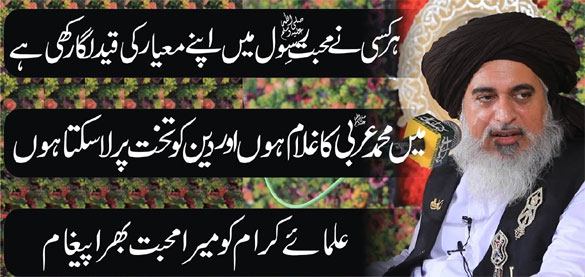
By Junaid Jahangir, New Age Islam
25 November 2020
Hardline Pakistani cleric Khadim Hussain Rizvi recently passed away. He was known for spearheading the movement on retaining blasphemy laws, lionizing the murderers of “blasphemers,” instigating youth to murder, and calling for the death punishment of Aasia Bibi of Pakistan. A few years ago, he was noted for using abusive and foul language and one would have thought of him as a fringe figure. Yet, aerial views of his funeral indicate that it was widely attended by an overwhelming mass following in tens of thousands. Another cleric Muhammad Raza Saqib Mustafai, banned in Denmark and Australia for his extremist views, mentioned in a video that his followers were not in lakhs (hundreds of thousands) but crores (tens of millions).
Social media including reporters, writers and columnists like Orya Maqbool Jan and Khalil ur Rehman Qamar are expressing their profound grief and referring to him with honorific titles. The fact that Prime Minister Imran Khan, who was called a “dog” and an “agent of Jews” by him, also tweeted his condolences, indicates the extent of his power and influence. Indeed, he leaves behind an institution where equally talented orators and fiery sermon deliverers would easily perpetuate his legacy. In short, just as there is a wave of Hindutva and Modi mania in India, Pakistan has come under the grip of clerics like Khadim Rizvi.
What explains the rise to power of obscure clerics like Rizvi? Is it the observation that he emerges from the class of people that shares economic frustrations due to rising economic inequality and which therefore seeks to redress its perceived “inferior” position by recourse to a narrative that emphasizes the “superiority” of Islam? However, economic opportunities would not necessarily assuage the perceived grievances of such a people, as access to increased resources would simply embolden them to perpetuate their narrative on a global scale. This much is true given the influence of such clerics on the Pakistani Diaspora in western countries. Alternatively, it is perhaps the establishment that is behind the rise to power and influence of such clerics.
This may be noted from the observation that many of Rizvi’s fiery speeches extolled a hawkish approach of firing missiles against the enemies of Pakistan and Islam but a predominate silence on the plight of the Uighur Muslims in China. Additionally, he targeted politicians across the spectrum keeping them in check and confirmed the tropes that keep the establishment relevant on defense by weaving patriotism with religion through tales of past Muslim warriors.
The role of the establishment in addressing religious fanaticism can be gleaned from the divergent viewpoints of Adam Smith and David Hume in the literature on the economics of religion. Hume favoured a state sponsored Church where the clergy could be bribed into indolence. Smith, however, favoured a free religious market where the size of each group or sect would be diminished by competition from rival factions.
It bears to be noted that the U.S. has a free religious market where fundamentalist Christian groups freely promote their anti-abortion and anti-LGBTQ views, whereas the U.A.E has heavy regulation of Friday sermons and quickly clamps down on anti-state elements. But the Pakistani situation is far more complex than picking the ideas of either Hume or Smith to address the fanaticism that has crept into the mainstream.
<
State regulation of religion in Pakistan is seemingly futile as the authority of any state sponsored religious group towards “moderation” would be flouted on their being stooges complicit in supporting state autocracy. The opposition to U.A.E. sponsored Mauritanian religious scholar Abdullah Bin Bayyah is one such example. In Pakistan, Dr. Fazlur Rahman Malik had to leave the country in 1968 despite patronage from the then president Ayub Khan, as he faced threats from conservative clerics. In recent times Javed Ahmad Ghamidi had to go into self-imposed exile for similar reasons.
On the other hand, free religious markets only work to diminish fanaticism if the market share of each group is competitively small and not oligopolistically large. However, one religious group can acquire a higher market share if it has access to a key resource another group lacks in terms of human capital through powerful orators with sharp memories and the charisma to connect with the masses. Additionally, the establishment itself can skew the market share if it overtly or covertly supports one group over another in a game of thrones, for example, by distinguishing between the good and the bad Taliban.
Therefore, Hume’s approach does not work if the state is weak and Smith’s approach does not work if the state supports a particular religious group, both of which impede curtailing fanaticism in Pakistan.

Religious extremism has become mainstream in Pakistan. This is evident not just by the grief expressed in Pakistan social media on Rizvi’s death but also from the observation that powerful members of the establishment have connections with such clerics who officiate their marriages and other religious rites. The position of liberal or left-wing critics is too ineffectual and weak to pose any challenge to the status quo.
Additionally, Pakistanis in the Diaspora are busy earning a livelihood or addressing racism in western societies to focus on the conditions in their mother country. Some western Pakistani youth latch on to movements like BLM, adopt social justice activism on indigenization and decolonization, all of which arise within a certain western context and use a western jargon for any of it to be relevant to addressing the pressing realities in Pakistan.

Other western Muslims become defensive and engage in whataboutism by deflecting to problems in other communities and countries. They pressingly want to address racism and Islamophobia but do not tackle religious fanaticism with the same fervour. Those that do address the fanaticism on blasphemy end up engaging with long winded textually religious arguments, which is necessary but also makes one wonder that even in 2020, such an approach is required for an issue as simple as not killing someone for a cartoon or caricature. Regardless, all of this means that if neither Pakistanis in Pakistan nor Pakistanis in the Diaspora are able to do much, the status quo is sustained, and religious fanaticism becomes mainstream in Pakistan.
Junaid Jahangir is an Assistant Professor of Economics at MacEwan University. He is the co-author of Islamic Law and Muslim Same-Sex Unions. With Dr. Hussein Abdullatif, a paediatric endocrinologist in Alabama, he has co-authored several academic papers on the issue of same-sex unions in Islam.

No comments:
Post a Comment